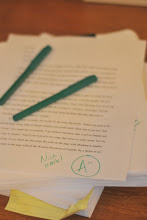This one courtesy of Carol Jago in her 2010 NCTE Presidential address: "To Cherish the Interests of Literature" from February's Research in the Teaching of English. Jago says:
"Speaking in a commencement address to graduates of the Stanford School of Education, Elliot Eisner (2006) argued that, 'Imagination is the neglected stepchild of American education. Questions invite you in. They stimulate the production of possibilities. They give you a ride. And the best ones are those that tickle the intellect and resist resolution.' It is a remarkable message to send to future teachers and school administrators who will be working in a country in thrall to testing. Eisner urges us to nurture questions not answers, most particularly questions without easy answers. Many teachers find it difficult to make time for such questions and imaginary play in a school day increasingly devoted to the mastery of basic skills. I worry that the focus on serious certainties may in the long run only contribute to our nation's continuing hard times. Consider the instructional approach of schoolmaster Thomas Gradgrind in Charles Dickens's Hard Times:
'Now, what I want is, Facts. Teach these boys and girls nothing but Facts. Facts alone are wanted in life. Plant nothing else, and root out everything else. You can only form the minds of reasoning animals upon Facts: nothing else will ever be of any service to them. This is the principle on which I bring up my own children, and this is the principle on which I bring up these children. Stick to Facts, sir!'
Well, you all know how things turned out in Coketown. Reading literature offers ballast to a Gradgrinding, facts-based education. Stories [...] feed the imaginations of young readers and resist narrative resolution. Such literature is compelling because of, not in spite of, its ambiguities."
Thank you, Carol Jago, for this succinct validation of why I teach the way that I do--mired in questions that have no answers, throwing complexity at my students and asking them to wade through it and find their own thread of meaning that they can then communicate clearly to the world, fighting to convince them that reading literature is the only way to prepare them for dealing with the complexity that their lives will present. They must learn to read their lives to write their future.
And how, please tell me, will standardized tests teach them how to do that?
(still dreading the hours I'll spend over the next few days watching a group of 25 sophomores take the state test...)
--M. Shelley
Monday, February 28, 2011
Subscribe to:
Post Comments (Atom)


No comments:
Post a Comment